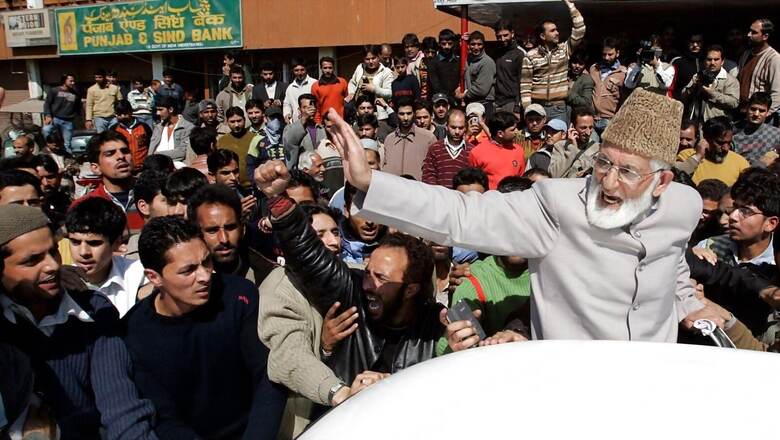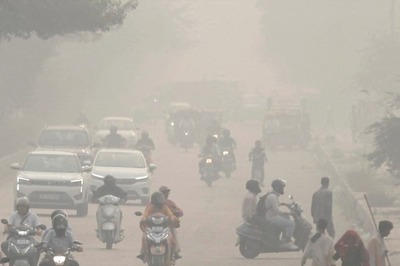
views
WBarring support to the Independent candidate Shamim Ahmad Shamim only to ensure defeat of the Congress-backed Bakshi Ghulam Mohammad in the 1971 Lok Sabha election in Srinagar, Sheikh Mohammad Abdullah called for boycott of all elections held by the Indian authorities in Jammu and Kashmir.
Bakshi had collaborated with Prime Minister Jawaharlal Nehru in dismissing and detaining Sheikh on August 9, 1953 and getting himself installed as Jammu and Kashmir’s head of the government, then called the Prime Minister.
Shamim polled 1,28,948 votes against Bakshi’s 71,140. That election created history as Sheikh, running a mass movement for Plebiscite from jail, proved to the world that neither the Congress party’s chief minister Ghulam Mohammad Sadiq nor the government’s candidate Bakshi, who replaced Sheikh and ruled J&K for over 10 years, were the bona fide representatives of the Kashmiris.
Greenhorn Shamim’s victory was also historic because all other elections since Sheikh’s dismissal in 1953 to his return to power under the Indira-Abdullah accord were brazenly rigged to ensure victory of the government’s candidates. In almost all these Assembly and Lok Sabha elections, nomination papers of most of the opposition candidates were declared invalid, Bakshi and Sadiq’s candidates were declared elected unopposed and some of the contestants were removed from the fray with bribes or intimidation.
History of Sham Elections
Shamim’s victory apart, the state’s first free and fair elections were witnessed not before the one for Lok Sabha in March 1977 followed by the one for the Legislative Assembly in June 1977.
Sheikh Abdullah had himself presided over J&K’s first dubious elections conducted by the state’s Election and Franchise Commissioner for the Constituent Assembly in September-October 1951. Sheikh’s National Conference (NC) nominees were declared elected unopposed in all the 75 constituencies—including all 43 seats in the Valley a week before the date of the polling. Praja Parishad fielded its candidates in 28 of the 30 constituencies in Jammu. As many as 13 of their nominations were nullified which prompted the party to boycott the polls. Consequently, the NC grabbed all the 75 segments without anybody voting at a polling station.
ALSO READ | When Jinnah Compared Sheikh Abdullah to a Rotten Egg, Rubbed People of J&K the Wrong Way
Bakshi’s Congress-backed ruling NC presided over the infamous Assembly elections of 1957, grabbing 68 of the 75 seats. However, it left 5 seats to be won by Praja Parishad, one to Harijan Mandal and one to an Independent. In 1962, the ruling NC grabbed 70 seats, leaving 3 to Praja Parishad and 2 to Independents.
From 1965 onwards, Congress ruled Jammu and Kashmir directly with Sadiq as its first chief minister. It repeated more or less the same practice of sham elections from 1967 to 1972 in which nomination papers of most of the potential opposition candidates were rejected.
In the Assembly elections of 1967, Sadiq’s Congress grabbed 60 of the 75 seats. It took 22 seats uncontested. As many as 118 opposition candidate’s nomination papers were rejected. The uncontested winners included Mufti Mohammad Sayeed from Bijbehara, who was inducted as a deputy minister, and Abdul Ghani Lone from Handwara, who was appointed as a minister of state. In the same year’s Lok Sabha elections, Congress swept all the 6 seats including Anantnag where Mohammad Shafi Qureshi was declared elected unopposed.
Geelani and Congress
As Congress in J&K developed factionalism between Ghulam Mohammad Sadiq’s and Syed Mir Qasim’s groups, Jamaat-e-Islami (JeI) discovered an opportunity to align with one group and steal some seats in the Assembly. In defiance to Sheikh’s boycott call, it fielded candidates in the panchayat elections of 1969 which were contested on non-party basis. JeI with Syed Ali Shah Geelani at the front made a series of desperate attempts to enter not only J&K’s Assembly but also Indian Parliament.
After an understanding with one faction of Congress, JeI fielded candidates in 22 segments in the Assembly elections of 1971. Congress repeated the rigging of the previous elections and grabbed 58 seats but facilitated the JeI to win 5 segments—Sopore (Syed Ali Geelani), Tankipora, now Habbakadal (Ghulam Nabi Nowshehri), Khanyar (Qari Saifuddin), Nandi, now Homeshalibug (Ali Mohammad) and Kulgam (Abdul Razaq Mir). It also left 3 to the Bharatiya Jana Sangh.
In the 1971 Lok Sabha elections, JeI fielded none other than its 42-year-old firebrand leader Syed Ali Shah Geelani who lost to the Congress candidate Syed Ahmad Agha in Baramulla. Later, Geelani also tried his luck in the 1977 Lok Sabha elections from Baramulla, which he lost to NC’s Abdul Ahad Vakil.
JeI’s base was limited to a class of well-educated people and it could not claim to be a victim of rigging till 1987 when alienation in the Valley was at its peak and Muslim United Front (MUF) had captured a part of the space vacated by Farooq Abdullah’s NC. Even after winning 5 seats courtesy Congress in 1972, JeI bagged only one seat of Sopore in the free and fair Assembly elections of 1977 when Geelani returned with a thin margin of 33 votes. Geelani polled 16,717 votes against his NC rival Hakim Habibullah’s 16,684. In 1983, JeI did not get a single seat.
When, post-Emergency, Indira Gandhi’s Congress lost the Lok Sabha elections to Janata Party and Morarji Desai took over as Prime Minister on March 24, 1977, Congress in J&K withdrew support from Sheikh’s government on March 26, 1977. Before the floor test, Sheikh Abdullah recommended to Governor L.K. Jha the dissolution of Assembly and fresh Assembly elections. After a huge constitutional controversy, Sheikh had the last laugh. President’s rule was imposed and Jha supervised the first clean Assembly elections in J&K in June 1977.
Winning 47 seats out of 76—as many as 39 in Kashmir where JeI’s Geelani got Sopore with 33 votes and Janata Party’s Abdul Ghani Lone and Abdul Rashid Kabli were returned from Handwara and Eidgah respectively—Sheikh became Chief Minister of the first legitimately elected democratic government.
While historic manipulation and established rigging, including invalidation of the opposition candidates’ nominations and tactical victories of proxy candidates, took place at a phenomenal scale from 1951-1972, politicians, commentators and analysts have been selectively and conveniently referring only to the alleged rigging on some seats in the 1987 Assembly elections. It just suited an anti-Indian narrative after the eruption of the militancy in 1989.
Fact of the matter is that one Hurriyat chief’s father as also Farooq Abdullah and Mufti Mohammad Sayeed were partners in the rigging in 1987 while Geelani and his JeI were complicit in and beneficiaries of the rigging in 1971.
Ahmed Ali Fayyaz is an independent journalist. He was Jammu and Kashmir bureau chief with The Hindu. The views expressed in this article are those of the author and do not represent the stand of this publication.
Read all the Latest News, Breaking News and Assembly Elections Live Updates here.

















Comments
0 comment